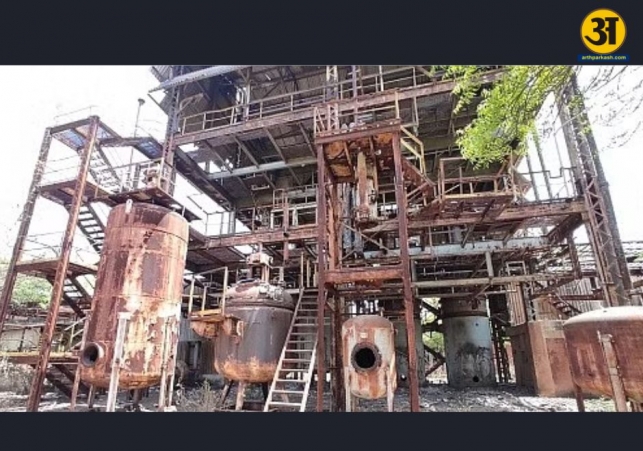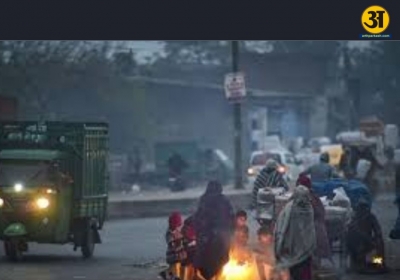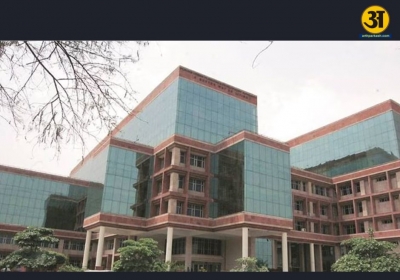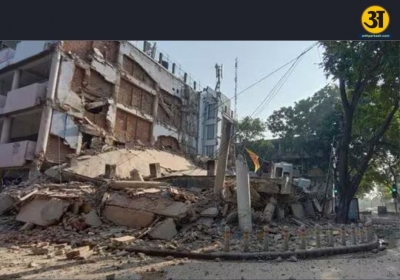
Bhopal Gas Tragedy affects next generation: Ex-Forensic Doctor
Bhopal Gas Tragedy impact visible in next generation, reveals Former Forensic Doctor
- By Gurmehar --
- Sunday, 24 Nov, 2024
The Bhopal gas tragedy, which occurred 40 years ago, still impacts the lives of those who survived, and even their children. A former forensic doctor, Dr. D.K. Satpathy, who worked during the disaster, has stated that the poisonous gases that leaked from the Union Carbide factory in Bhopal affected not just the victims, but also the next generation of survivors.
The disaster and its immediate impact
On the night of December 2-3, 1984, a lethal gas leak from the Union Carbide pesticide factory in Bhopal resulted in one of the world's deadliest industrial disasters. The gas, primarily methyl isocyanate (MIC), spread over the city, causing widespread panic and killing thousands. Official figures estimate at least 3,787 deaths, while over five lakh people were affected by the toxic exposure.
Dr. Satpathy, who was the head of the forensics department at Gandhi Medical College in Bhopal, recalled the chaotic days after the leak. On the first day itself, he performed 875 post-mortems, and over the next five years, he was involved in more than 18,000 autopsies of the survivors. He witnessed the deadly aftermath of the tragedy and was at the forefront of understanding its health consequences.
In his recent statements, Dr. Satpathy emphasized that the effects of the gas leak were not limited to the immediate victims. Many of the children born to the women who survived the tragedy also showed signs of the poisonous substances in their bodies. According to Satpathy, the Union Carbide company had dismissed concerns about the impact of the gas on unborn children, claiming that the toxic substances would not cross the placental barrier. However, Satpathy and his colleagues found otherwise.
During the investigation, blood samples from pregnant women who had died due to the gas leak were examined. The study revealed that the children in their wombs had toxic substances in their bodies, with about 50% of the poisonous substances present in the mother also found in the child. This finding pointed to the long-term and far-reaching impact of the gas leak on future generations.
The harmful effects of the gas did not end with the direct victims. Dr. Satpathy argued that the toxins that entered the bodies of pregnant women affected the health of their children, leading to various health problems in the next generation. These children were born with the poisonous substances in their systems, and this had lasting consequences on their health.
For years, research on the issue was either dismissed or stopped, which led to many unanswered questions about the full impact of the gas on the survivors and their children. Dr. Satpathy believes that these effects will continue for generations to come, as the damage caused by the gas leak may be inherited by future descendants.
Health consequences of the Gas Leak
The gas leak primarily involved methyl isocyanate (MIC), a highly toxic substance. When MIC gas came into contact with water, it reacted to form various toxic compounds. These compounds were responsible for a range of health issues among the survivors, including cancer, blood pressure problems, and liver damage. The toxins caused immediate harm to the respiratory system, leading to severe lung damage, but the long-term effects were even more troubling. Many survivors developed chronic illnesses and faced a reduced quality of life.
Dr. Satpathy pointed out that the gas caused both immediate and long-lasting health consequences, not just for those who were exposed directly to the gas, but also for those who were indirectly affected by its spread. These effects included birth defects and developmental issues in children, as well as chronic diseases in adults. Over the years, many survivors have struggled with health problems related to the disaster, which were made worse by the lack of proper medical treatment and support.
ALSO READ: Who is Sagar Adani? Nephew of Gautam Adani accused of bribery and fraud in US
ALSO READ: Kerala HC initiates probe into Minister’s controversial anti-Constitution remarks
A critical point that Dr. Satpathy raised was the lack of follow-up research on the long-term effects of the gas leak. While the immediate health crisis was addressed to some extent, the long-term consequences were not fully explored. Satpathy questioned why research on the effects of the gas on unborn children and future generations had stopped. He highlighted that such research could have provided important insights into the continuing impact of the tragedy on survivors and their descendants.
The absence of comprehensive research has left many survivors without answers to their health concerns. Without a clear understanding of the full extent of the harm caused by the gas leak, many individuals have struggled to get the necessary care and treatment for the issues they face.
In response to the ongoing suffering of the survivors and their families, several activist groups have continued to raise awareness about the Bhopal gas tragedy. One such group is the Bhopal Group for Information and Action, which is dedicated to supporting the victims and advocating for justice. Rachna Dhingra, a member of the group, shared that many individuals, including Dr. Satpathy, senior doctors, and first responders, have recounted their experiences of the disaster. These personal accounts help keep the memory of the tragedy alive and emphasize the need for justice and recognition of the suffering caused by the gas leak.
Another important group involved in the fight for justice is the Bhopal Gas Peedit Mahila Stationery Karmchari Sangh, led by Rashida Bee. To mark the 40th anniversary of the tragedy, they organized a poster exhibition that covers every aspect of the disaster. This exhibition is aimed at educating people about the ongoing consequences of the tragedy and highlighting the need for accountability and compensation for the victims.
In addition to the poster exhibition, a rally will be organized to mark the 40th anniversary of the gas leak. This rally will focus not only on the specific injustice faced by the Bhopal survivors but also on broader global issues such as industrial pollution and climate change. The organizers hope to draw attention to the continuing risks posed by corporate negligence and the need for stricter regulations to protect the environment and public health.
As the anniversary of the tragedy approaches, it is important to remember the victims and survivors and the ongoing struggles they face. The Bhopal gas tragedy remains a tragic reminder of the dangers of industrial accidents and the long-lasting impact they can have on communities. While much has been done to provide some compensation and aid to the survivors, the fight for justice is far from over. Many survivors continue to face health problems, and the full extent of the tragedy’s impact is yet to be fully acknowledged.
The Bhopal gas tragedy was a disaster of unprecedented scale, and its impact continues to be felt by those who survived and their children. The findings of Dr. Satpathy and other experts have shed light on the lasting effects of the gas leak on future generations. The tragedy’s long-term health consequences, coupled with the lack of ongoing research and proper support for survivors, make it clear that the fight for justice is far from over. As the 40th anniversary approaches, it is crucial to remember the victims and continue advocating for justice, accountability, and support for the affected families.





